|

Interview with
Chris Caffery and Alex Skolnick, Trans-Siberian
Orchestra (January 2010)
Trans-Siberian
Orchestra's traveling holiday rock opera is a multimillion-dollar act
that keeps growing since its inception in 1996. Their rock renditions of
traditional Christmas songs performed by 14 musicians, 14 vocalist and
two narrators with a full-on synchronized light show with lasers and
pyrotechnics captivates audiences of all ages.Mastermind Paul
O'Neill, former Savatage vocalist Jon Oliva, Robert Kinkel and Al
Pitrelli knew they were on to something special when they created the
band using a Christmas theme from a song off a Savatage album. And most
of the current TSO members have been in Savatage at one time or another.
Trans-Siberian Orchestra became so big that in 2000 that the band split
into two camps, East and West bands, enabling the musicians to perform
simultaneously in two cities, two shows daily on the weekends, for a
solid two-plus months during the winter. Their latest release, "Night
Castle," a two-CD set, is their first non-Christmas album since 2000 and
includes four remakes of classic Savatage songs.
I had the chance to sit down and casually talk with guitarists Chris
Caffery and Alex Skolnick of TSO East before their Dec. 26 show at
Allstate Arena in Rosemont, Illinois. The two have been around the music
business for years and know how to entertain. Not only that, they are
hardworking and honest musicians who are fans of heavy metal, and they
put the fans first, realizing that they would not be where they are
without devoted support.
| Briefly
explain the history and origin of TSO.
Chris: Well, Savatage, which is a band
that Alex and I played in, had a record called "Dead Winter Dead,"
which is a rock opera that was released in 1995. On that record
was a song called "Christmas Eve (Sarajevo)," which is an
instrumental song that started getting some really heavy airplay
on adult contemporary stations at Christmastime.
Nobody expected it, especially in
Tampa, Florida, where it went to No. 1. It was a big T1 station
and the DJ there turned it onto Scott Shannon at a huge radio
station in New York City called WPLJ, and that was right in
Atlantic Records' backyard and they were able to make it go No.
1 there. From there, obviously we really didn't think we could
sell Savatage as Christmas, so that's where the whole "How can
we sell this song?" concept came in. Paul O'Neill came up with
the story for "Christmas Eve and Other Stories," and was written
around that song, and 13 years later, it's a lot bigger than
anybody ever expected.
Alex: It's a rock concert and a holiday
show. It's like a traveling holiday show that rock fans and
families can go to, and have them come back year after year.
And when did you realize that TSO had gotten so big that
you had to split the band into an East/West format?
Chris: Well, there's only so many days
between, at the time we started, that it was between
Thanksgiving and Christmas, because we really didn't think we
could tour before Thanksgiving. So the whole idea with promoters
and radio was, "Look, we can't really push a show any day before
Thanksgiving or any day after Christmas," so we decided to split
it so we could fit shows in between, theoretically, November
26th to December 26th. That was the whole idea there, and then
eventually we were able to start October 1st and go as late as
the end of the first week in January, and we never knew that it
would be able to stretch as far as it did. Even now that we can
go that far, there's still probably another, I'd say, 50 cities
we could still play in but don't have the opportunity to.
With so many great musicians in one band, or I should say
two bands, are there any conflicts musically or personally, or
is every member's role defined?
Alex: The whole thing is very
well-directed. Everybody has their place, sometimes you find
your place in the show. When I started doing the show, I hadn't
played in Savatage for a long time, and I wasn't familiar with
Trans-Siberian Orchestra. Back then it was mostly theaters, and
it kind of developed on its own. I stepped away in 2003, came
back in 2004 and we were playing arenas, and then I kind of just
found a place in the show. I found that everybody who comes
along and plays in the show sort of finds their place but
without changing the essence of the show.
Chris: There's a definite formula
that's involved and everybody plays together great. I don't
think there's anybody here who is the type of musician who's
going, "Hey, look at me." I mean, everybody knows that they can
play and everybody plays what they can play well, and we go up
there and the most important thing is that the band plays well,
and that's the best thing about it. We put on the best possible
show for the people who are out there because there's a lot of
things people could be spending their money on other than our
concert. We realize that, and that, in the end, is the most
important thing because regardless of how you try to portray
yourself as a musician, if you're playing in front of six people
in the bar down the street, it's really not gonna pay your bills.
And it's not that this is about paying bills, it's about making
sure that the people who come to the show get their money's
worth because they work hard for it.
Alex: It's a big team effort going on. |
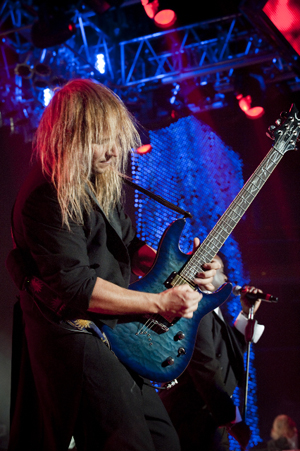 |
|
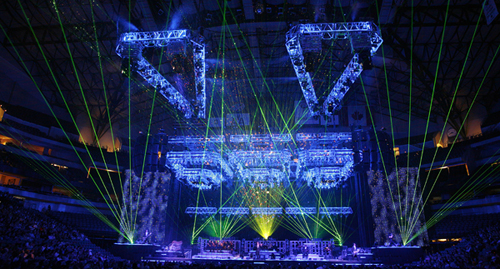 |
I can sense that there are no egos involved,
but are there any arguments over the musical arrangements? How
do you decide the amount of leads divided between the two of you?
Chris: If anything, we
usually argue about doing less (laughs).
Alex: Exactly, the less
the better (laughing).
Chris: We usually say (to
each other) "I don't want it, you take it!"
Not many bands these days show the kind of
respect to their fans that you do. What does it mean to you to
be accessible to your fans, and how important is it to put on a
great show?
Chris: Well, it's like I
said, if they weren't here, we wouldn't be here. So, in essence
of anything, that's the most important thing. I mean, they are
what keeps us in these arenas every year. Without them, we
wouldn't be doing this, so I mean ... I found out a long time
ago that the tiniest things that a musician you're influenced by
can do, are kind of like ... maybe someone in your family died
or something, and you're running down a hallway and someone
tries to grab you and you just walk by them and someone goes "Hey
this guy's a jerk."
There's circumstantial
things and then there's people you meet that you know are just
complete ... And I've found that when I was younger, that leaves
a lasting impression on you. I've met certain people when I was
younger, when I stood out in the freezing cold waiting to get an
autograph or shake a hand and they looked at me and walked by,
and that made a lasting impression on me. |
| Which bands
did that? Chris: I'm ... not going
to say (laughing).
Alex: You don't want to say that! (laughing)
Chris: Let's put it this way, Iron
Maiden and Judas Priest were nice guys.
Alex: I've had experiences with some
bands I met as a fan and they weren't very nice, and then I'd
meet them backstage at a concert, and they'd say, "I love your
work." It's weird, but everybody in this band is down to earth,
and we try to be as nice to the fans as possible.
The TSO show is so age-, race- and religion-diversified.
Why do you think you appeal to such a wide audience?
Chris: There are just so many different
generations (coming to the shows). There's 60-year-old
grandparents who listened to Black Sabbath who have a
40-year-old son who now has a son coming to the show. I had one
fan tell me that he hadn't seen his uncle for years and then
they came to the show, and now they go fishing every year. Just
different generations coming together because of the show.
Alex: It's a show that's not as boring
as someone would think a theater show is, or going to "The
Nutcracker," where people tend to be uptight or you have to get
all dressed up and it's more formal. I mean. people come here
dressed to the hilt, but then there's people in Ramones and
Maiden T-shirts.
Chris, is the possibility of a new Savatage album out of
the question? What are your thoughts on collaborating with Jon
and the boys again?
Chris: I don't think that will happen.
I would like it to happen, and I know other members in this band
would like it to happen. I can't say yes it will happen and then
sometime down the line it doesn't happen and I'll get called The
Boy Who Cried Savatage! And if it does happen and it turns out
bad, then you'll have the people saying "I knew that would
happen." |
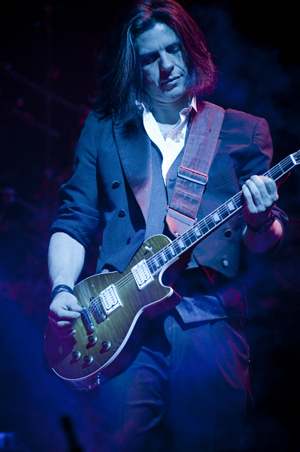 |
|
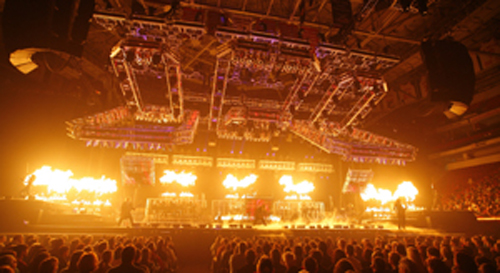 |
Alex, will you rejoin Testament after the TSO tour, and can we
expect a new album soon?
Alex: I have a week off after the TSO tour,
then we do the Slayer/ Megadeth American Carnage dates. (Editors note:
As reported Jan. 7, the tour was canceled because of Tom Araya's
scheduled back surgery). We're rehearsing for the new album, but we want
to take our time again like we did with "Formation of Damnation" because
I think it turned out well.
Any last words for your die-hard fans?
Chris: Thank you!
Alex: We wouldn't be here without you, and
we'll see you in the spring for our "Night Castle/Beethoven's Last Night"
tour, which will be our first nonholiday tour.
Interviewed by Kelley Simms
|
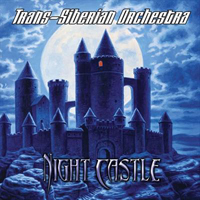 |
Trans-Siberian Orchestra -
Night Castle
Album available on Atlantic
Recordings Corporation.
Website:
www.trans-siberian.com |
|